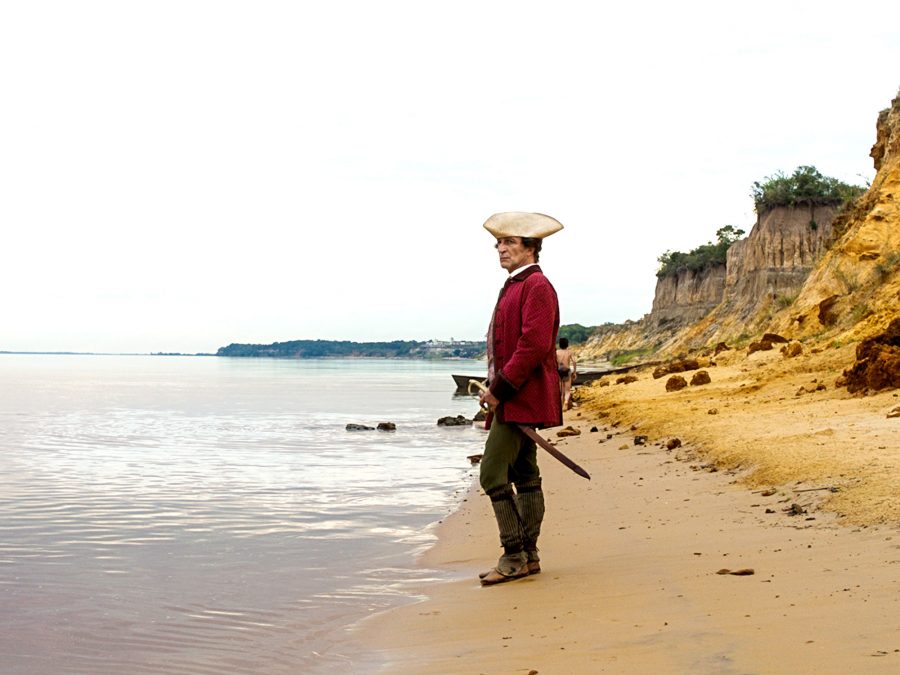Lucrecia Martel’s tale of colonial misadventure in South America is one of the great cinematic achievements of the decade.
In 2016 the American publishing imprint New York Review Books released a timely translation of a 1956 Argentine novel named ‘Zama’ by the author Antonio di Benedetto. Timely in that it helpfully preceded the release of a much touted film adaptation by the staggeringly talented director Lucrecia Martel.
Reading the book in anticipation of the film, two thoughts occurred: one, that this abrasive study of a disconsolate, cock-blocked political functionary trapped in the crumbling South American outpost of Asunción, Paraguay during the late 18th century, is surely, in the West, to be considered a lost literary classic; and two, that transforming it into a film is an impossible endeavour, as the text is largely formed of circuitous, self-abasing inner monologue. In short, it’s some really gnarly shit.
But we all know that the cinematic masterworks which endure over time are those forged from tougher material, and so it is with Martel’s astonishing, intuitive and desperately sad new comedy. Her adaptation – lightly abridged but thematically perhaps more expansive – maintains Zama’s pitiful sexual neediness, but emphasises his story as a cautionary tale of colonial misadventure.
Our hapless hero’s futile station is teased in the film’s opening shot as Zama, smartly turned out in official military threads and tricorn hat, strikes a mighty pose on a shoreline and glances out to sea. His desire for escape and autonomy is palpable, but so is the sense that he is, like Antoine Doinel at the end of The 400 Blows, standing at the edge of the world with nowhere to go but backwards.
In the lead role is Daniel Giménez Cacho, whose tamped-down and softly expressive performance perfectly transmits Zama’s barely concealed astonishment at his endless run of bad luck. Every element of the film conspires to mock his lowly stature, from where he’s placed in the frame (often locked to one of its edges) to the symphony of chirps and tweets which emanate from the backdrop and ally his actions to those of local fauna.

There is a sequence in which he is in the middle of an altercation with a co-functionary. As he talks, a llama wanders into the room, stops next to him, looks around, and then wanders out again. Cacho manages not to inch, playing the moment as just another surreal interlude in this lawless outland where man and beast are largely interchangeable. One beast who is the subject of much contemplation, however, is the elusive bogeyman known as Vicuña Porto, a figure whose murderous antics are causing vital blockages on the trade routes between nearby townships. Attempts to track and kill the elusive Porto appear to be the cause of the administrative disarray.
The loose-leaf plotting sees Zama attempt to secure a written permission to return home to his wife and children, thereby fulfilling the masculine ideal of family man and protector. Duty aside, his all-pervasive sexual longing leads him to spy on a circle of bathing beauties and also attempt to seduce the cigar-smoking, acid-tongued treasurer’s daughter, Luciana Piñares de Luenga, played as a boisterous man-eater by the always wonderful Spanish actor Lola Dueñas.
His laughable attempts at playing away are hampered by his earnest charm, and Cacho, through his performance, manages to beautifully stress Zama’s limits as both a bureaucrat and an amorous dandy. This deplorable gure eventually catches sight of his own deficiencies as a human, and retreats towards the warm embrace of certain death in the film’s quixotic closing chapter.
In the spirt of its chaotic setting, the story is unfurled as a calypso-soundtracked stream-of-consciousness, a rustic dream state which reflects the notion that Zama himself is reacting to the moment rather than executing some carefully devised political masterplan. In the end, the film is about a man who sells his soul by the increment as he eventually realises he’s alone in the world. It also suggests that those carrying out the imperialist dictates of a home nation are naturally drawn to exploitation, as if it’s the only way to exert political power. He hates having to ask other people to help him lest it undermine his middling title. He also likes to milk his status for all its worth, especially when it comes to “helping” his female maids or the indigenous locals who clearly despise his presence.
Even though the film is set centuries ago, there’s something futuristic, maybe even post-apocalyptic, about the frazzled, comically unfair world that Martel manufactures. Zama is an unexceptional man, a drone in many respects. Yet Martel is supremely empathetic in her depiction of this person who is tempted by selfish impulse but rejected by the world around him. Maybe because, until the very end, he is seduced by the notion of hope and the touching belief that he will be saved by his cohorts before it’s too late. Only in beating his addiction to hope does he eventually find the transcendence and escape that he craves.
Published 23 May 2018
Through the god damn roof. 2008’s The Headless Woman is a masterpiece.
Bewitching. With every edit comes a surprise. Need to see it again, and fast.
Hard to suppress the hyperbole with this one. Truly an awesome achievement.

By Adam Nayman
Juliette Binoche goes looking for love in this scintillating comedy-drama from French director Claire Denis.

By Matt Thrift
It took the best part of a decade to bring Zama to the big screen. Its writer/director tells us about her epic journey.

Start getting excited for new works from Amma Asante, Marielle Heller and Mia Hansen-Løve.